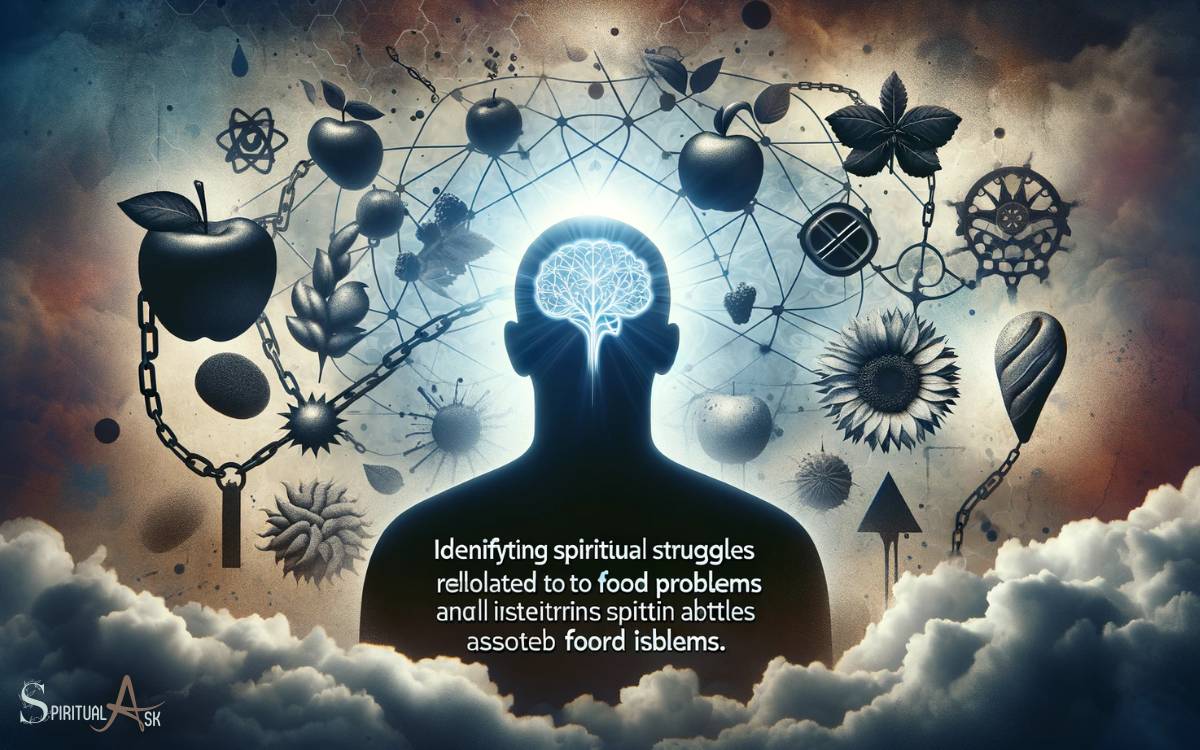Eating Disorders and Spiritual Warfare: Explain!
Eating disorders, such as anorexia nervosa, bulimia nervosa, and binge-eating disorder, are complex mental health conditions that can have severe physical and psychological consequences.
They involve an unhealthy focus on eating, body weight, and shape, often coupled with extreme dietary habits.
For some individuals, the struggle with eating disorders may also intersect with spiritual beliefs, leading to a perceived battle of spiritual warfare where one’s faith and inner strength are called upon to overcome the disorder.
Some individuals may lean on their spirituality or religious practices as a source of strength and guidance in their recovery journey.
For example, a person might:
Spirituality can offer solace and motivation to those battling eating disorders, providing hope and a sense of purpose during the recovery process.

Key Takeaway
Eating Disorders and Spiritual Warfare Aspects
| Eating Disorders | Spiritual Warfare Aspects |
|---|---|
| Anorexia Nervosa | 1. Identity distortion: Believing lies about self-worth and body image. 2. Fear and control: Struggling to maintain a sense of control through self-starvation. 3. Isolation: Withdrawing from relationships and spiritual support. |
| Bulimia Nervosa | 1. Guilt and shame: Feeling unworthy due to binging and purging behaviors. 2. Self-punishment: Engaging in harmful behaviors as a form of self-punishment. 3. Deception: Hiding behaviors and feelings from others. |
| Binge Eating Disorder | 1. Emotional imbalance: Using food to cope with emotions and spiritual emptiness. 2. Gluttony: Engaging in excessive consumption without restraint. 3. Lack of self-control: Struggling to maintain balance in eating habits. |
| Orthorexia Nervosa | 1. Idolatry: Placing extreme importance on clean or pure eating. 2. Legalism: Rigid adherence to self-imposed dietary rules. 3. Judgment: Criticizing oneself and others for perceived dietary failings. |
| Other Specified Feeding or Eating Disorder (OSFED) | 1. Confusion: Struggling to understand one’s experiences and behaviors. 2. Spiritual oppression: Feeling weighed down by oppressive spiritual forces. 3. Disconnection: Feeling disconnected from one’s true identity and purpose. |
Understanding Eating Disorders
Eating disorders, a group of serious mental health conditions, manifest through an unhealthy relationship with food and body image, impacting individuals’ well-being and daily functioning.
You or someone you know may struggle with one of the many forms such as anorexia nervosa, bulimia nervosa, or binge-eating disorder. These are not choices but complex illnesses influenced by genetic, biological, psychological, social, and environmental factors.

Recognizing an eating disorder can be challenging. You might notice extreme dieting, an obsession with calories, or a distorted self-perception. It’s critical to understand that behind these behaviors often lies a profound struggle with control, self-worth, or trauma.
If you suspect someone is suffering, approach with empathy and encourage professional support. Recovery is a journey, but with appropriate treatment, individuals can reclaim their health and happiness.
The Spiritual Dimension Explored
While addressing the psychological and physical aspects of eating disorders is crucial, exploring the spiritual dimension can offer additional insights into the complex interplay of factors that contribute to these conditions.

It’s about understanding how your inner beliefs and values shape your relationship with food and your body.
Consider how these elements might resonate with you:
- Sense of Purpose: Reflect on whether your sense of meaning influences your eating habits.
- Inner Peace: Assess how internal conflict might manifest as disordered eating.
- Connection: Explore your feelings of belonging or isolation and their impact on food.
- Forgiveness: Contemplate the role of self-forgiveness in your healing journey.
- Hope: Recognize how spiritual hope can empower you to seek recovery.
In doing so, you’ll discover that spirituality can be a profound source of strength, fostering resilience in the face of eating disorders.
Identifying Spiritual Struggles
You might not immediately recognize the spiritual battles that often accompany eating disorders, as they’re deeply ingrained and can manifest in various forms of inner turmoil.

Research suggests that this inner conflict can exacerbate the psychological struggle, making recovery more challenging. It’s essential to identify these hidden struggles, as addressing them can be a pivotal step in the healing process.
Recognizing Hidden Battles
Often, the most profound spiritual struggles manifest subtly, eluding detection as they intertwine with the complexities of eating disorders.
You might not recognize these battles because they’re masked by behaviors and thoughts that feel all too physical and rational. Yet, beneath these symptoms often lies a deeper spiritual turmoil.
To help you identify these hidden battles, consider the following signs:
- Persistent feelings of unworthiness, despite reassurances
- A sense of isolation, even when surrounded by support
- Intense fear of judgment, extending beyond mere self-consciousness
- Compulsions that seem to have a punitive quality
- Moments of despair that coincide with negative self-talk or harmful behaviors
Being aware of these signs can be a step towards understanding the spiritual dimensions of your struggle with an eating disorder.
Inner Conflict Manifestations

Acknowledging these hidden battles paves the way for a deeper exploration of how inner conflicts related to eating disorders can surface as spiritual struggles.
You might notice feelings of unworthiness, shame, or a profound sense of disconnection that transcends physical symptoms.
These emotional experiences often reflect a spiritual turmoil where your beliefs, values, and identity are under siege.
| Spiritual Struggle | Potential Manifestation |
|---|---|
| Loss of Meaning | Questioning life’s purpose in the face of an eating disorder |
| Moral Dilemmas | Conflicting feelings about self-care versus self-harm |
| Identity Crisis | Doubt in self-worth or purpose linked to body image |
Your journey to healing involves not just addressing the physical aspects of the eating disorder but also the underlying spiritual conflicts. Understanding these struggles is a compassionate step towards reclaiming your inner peace and well-being.
Faith-Based Coping Mechanisms
You might find solace in prayerful healing practices, which research suggests can be a source of personal strength and recovery when grappling with an eating disorder.

Turning to scripture may offer you a sense of empowerment and resilience, reinforcing your inner fortitude against the challenges you face.
Additionally, building a network of community support provides you with a compassionate safety net, vital for your journey towards healing.
Prayerful Healing Practices
Prayerful healing practices serve as a cornerstone for many individuals battling eating disorders, offering a spiritual framework that can complement traditional therapies.
These practices can anchor your recovery journey, providing solace and strength. They are deeply personal, yet universally understood as a form of seeking peace and guidance.
Consider incorporating these into your healing process:
- Daily prayer or meditation to foster inner calm and mindfulness.
- Scriptural readings that emphasize self-worth and divine love.
- Participation in spiritual or religious communities for support and companionship.
- Mindful eating techniques, blessing or giving thanks for food as a gift.
- Journaling reflections on gratitude and progress, acknowledging the spiritual journey.
Each step invites a more profound connection to your faith, aiding in the transformation from struggle to healing with compassion and understanding.
Scripture for Strength
Harnessing the power of scripture can offer immeasurable strength and comfort to those facing the challenges of eating disorders.

When you’re grappling with such a complex condition, it’s crucial to find anchors that provide solace and guidance.
Studies suggest that spiritual practices, including meditation on scripture, can contribute to better mental health outcomes by fostering hope and resilience.
Incorporating verses that speak to your intrinsic worth and the promise of divine support may fortify your spirit as you navigate recovery.
Remember, scripture isn’t just words; it’s a connection to a belief system that emphasizes your value beyond physical appearance or dietary habits.
Leaning on these sacred texts, you’re not just reading you’re engaging with a community that holds your well-being as a sacred priority.
Community Support Networks
While personal meditation on scripture can be a powerful source of comfort, engaging with community support networks offers a collective strength that can significantly bolster your journey through eating disorder recovery.
These networks provide a sense of belonging and understanding that can be vital to your healing.
Here are some ways they can support you:
- Prayer groups: Participating in group prayers for strength and healing.
- Faith-based counseling: Access to counselors who share your spiritual values.
- Supportive fellowship: Meetings with individuals who have faced similar struggles.
- Volunteer opportunities: Serving others, which can improve self-esteem and purpose.
- Spiritual mentorship: Guidance from someone who has a strong faith foundation.
Healing Through Spirituality

Exploring spirituality can offer a profound source of strength and solace as you navigate the complex journey of recovering from an eating disorder. Engaging with your spiritual beliefs may provide a sense of purpose and hope, essential elements in the healing process.
Research suggests that spiritual practices like meditation and prayer can reduce stress and improve mental health, potentially mitigating some triggers of disordered eating.
It’s important to approach spirituality with an open heart and a critical mind, discerning what genuinely nurtures your well-being.
Embracing a spiritual path isn’t a quick fix but a supportive layer in the multifaceted approach to recovery. Remember, healing is not linear, and spirituality can be a valuable companion on your path to wellness.
How Can Spiritual Warfare Impact Eating Disorders?
Young Catholic spiritual warfare can significantly influence the approach and understanding of eating disorders, considering the interplay of psychological, physical, and spiritual dimensions:
- Mind-Body-Spirit Connection: Recognizes that eating disorders are not just physical ailments but involve mental and spiritual struggles, emphasizing the need for a holistic approach to healing.
- Prayer and Faith: Encourages the use of prayer and faith to seek strength and guidance, fostering resilience and a sense of support in overcoming challenges.
- Community Support: Emphasizes the role of the faith community in providing support, understanding, and encouragement, reinforcing the individual’s efforts in battling the disorder.
“In the realm of Young Catholic spiritual warfare, the battle against eating disorders is fought not just on a physical level but through the power of prayer, community, and spiritual resilience.”
Nurturing Resilience and Recovery
Building resilience in the face of an eating disorder empowers you to reclaim control of your life and fosters enduring recovery.

Resilience isn’t just about bouncing back; it’s also about learning from your experiences and growing stronger. This journey, while challenging, can lead to profound personal development.
Here are ways to nurture your resilience:
- Establish a supportive network that includes professionals, loved ones, and peers in recovery.
- Set realistic goals and celebrate the small victories on your path.
- Develop healthy coping mechanisms for stress, such as mindfulness or exercise.
- Engage in activities that bring joy and reinforce a positive self-image.
- Cultivate self-compassion and challenge negative thoughts with evidence-based affirmations.
Conclusion
In your journey, remember that eating disorders are not just physical battles; they’re spiritual too. Embrace faith as your shield, for it can foster resilience and guide you toward healing. You’re not alone lean on that higher power.
Together, let’s light the path to recovery, step by faith-filled step. Bear in mind, the strongest warriors often have the most scars. Yours tell a story of a fight, and most importantly, of the triumph yet to come.






